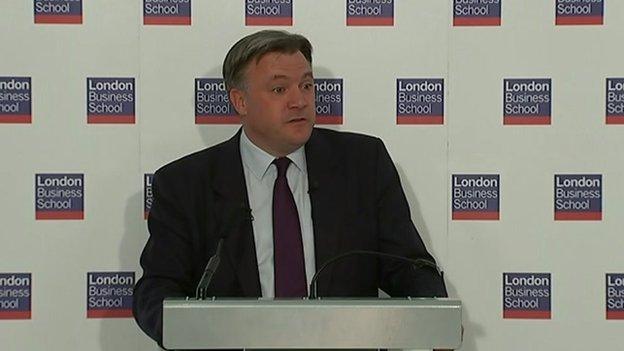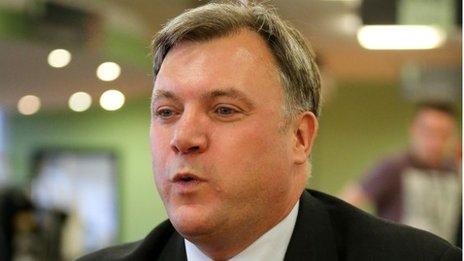Balls claims Blair's 'third way' has failed
- Published

Ed Balls says a fairer deal is needed on business taxation
Shadow chancellor Ed Balls claims Tony Blair's "third way" to improve the prospects of ordinary workers has failed - as he outlined Labour's tax plans.
He said the Labour government had not foreseen the financial crisis which hit middle and lower income families very hard.
Labour would help non-graduates and close tax loopholes, he said.
But the Tories say Labour is "the biggest risk" to economic recovery.
In a speech to the London Business School, Mr Balls unveiled a number of proposals to encourage long-term business investment in the UK and a "fairer" tax system.
This would include freezing some business rates and promoting skills through an expansion of technical colleges. He also hinted that Labour might make further cuts to welfare spending.
He said he had "sympathy" with the argument that the "third way" championed by Mr Blair and former US president Bill Clinton had not succeeded.
'New approach needed'
"We did not do enough on skills," he said. "And the failure of all parties, in the UK and all countries in the developed world, to see the coming crisis was a huge error.
"I do not believe that the progressives were wrong in their central belief that a path could be taken between free market economics and protectionism and isolationism.
"My argument is that the third way did not deliver because the world was changing in a more profound way than any of us anticipated - and new times now demand a new approach."
Mr Balls said Labour had not foreseen the instability caused in financial and tax systems by globalisation.
"And here in Britain, the Labour government ended self-regulation by introducing the Financial Service and Markets Act," he said.
"And while voices in the City and across the right, including George Osborne, argued that we were being too tough on the financial sector, we should have been much tougher still."
Incentives
Mr Balls said labour mobility had also been "much greater than anyone expected".
"Just as hundreds of thousands of Eastern Europeans have come to live and work in the UK and other developed countries across Europe, so too have millions of Mexicans and Latin Americans moved to the United States, and Indians and Chinese to the relative riches of the Middle East - a new global and mobile middle class.
"Additional competition for low-skilled jobs, and increasingly intermediate-skilled jobs, has put great pressure on communities."
Mr Balls said Labour was looking at structural changes to the tax system to incentivise long-term investment.
This would include introducing an allowance for corporate equity to counter the current corporation tax system that treats debt interest payments as a deductible expense.
"Such a scheme would offer a strong incentive for long-term investment, building more robust businesses that would be better able to plan for the future," Mr Balls said.
"We will consult with business and other stakeholders on the case for introducing this reform and how it might be implemented.

Labour's pledge to freeze energy prices has caused concern in business circles
The coalition has repeatedly cut corporation tax since taking office in 2010, when the rate was set at 28%. It is due to drop to 20% in 2015-16, the financial year that begins in April - a month before the general election.
Mr Balls said he did not think a further cut in corporation tax was the right priority next year. "We will, instead, cut and then freeze business rates for more than 1.5 million business properties," he said.
"When resources are tight this is a difficult choice to allow us to support more businesses and keep our overall business tax regime competitive.
"The purpose of a competitive tax system must be that companies view Britain as a great place to do business, not simply a cheap place to shift profits."
'Arbitrary'
A Labour government, Mr Balls added, would act to tackle tax avoidance, close loopholes and ensure tougher independent scrutiny of the tax system.
Several senior Labour figures, including Lord Mandelson, have urged leader Ed Miliband to do more to show he backs enterprise amid unease in business circles about some policies - including a planned 20-month energy freeze.
John Mills, one of Labour's largest private donors, told BBC Radio 4's World at One programme he welcomed the fact the party was now "refining its rhetoric" on business in the run-up to the election.
But former Labour peer Lord Haskins said Mr Miliband was unlikely to enjoy the same backing from business as his predecessors Tony Blair and Gordon Brown following his "arbitrary intervention" in the energy market.
Conservative Business Minister Matthew Hancock accused Mr Miliband and Mr Balls of planning to put up taxes on businesses and jobs.
"It's clear that the anti-business Labour Party is the biggest risk to the recovery, to investment and to jobs," he said.
"Ed Miliband predicted that our long-term economic plan would cost 'a million jobs'. But our tax cuts - paid for by difficult decisions that Labour opposed - have helped firms create two million new jobs - that's two million people with the security of a regular wage and a chance of a brighter future."
Employers' group the CBI said a competitive tax system, including an "attractive" basic rate of corporation tax, was crucial for future economic growth.
- Published12 March 2014

- Published14 October 2013
